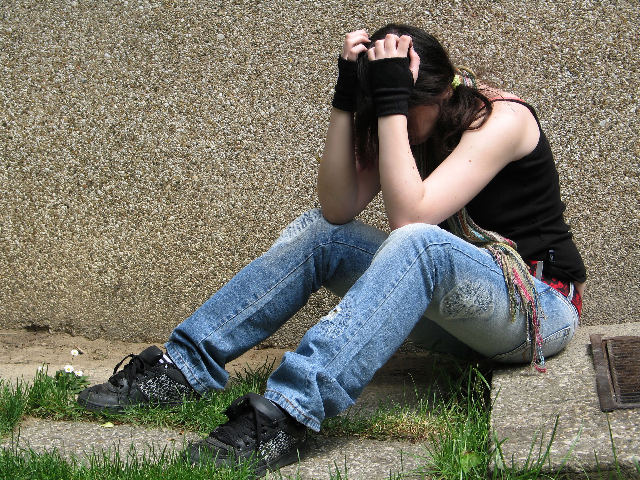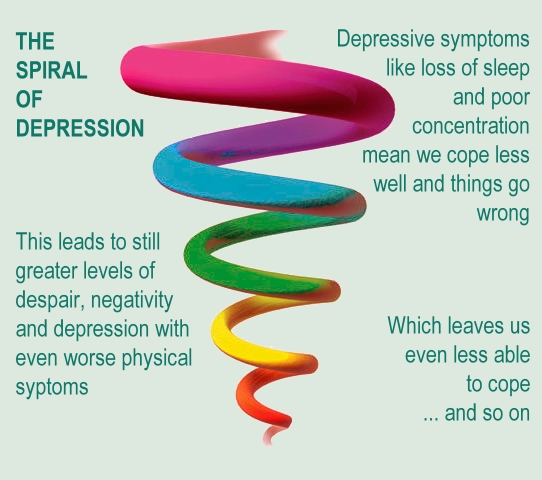Moderate to Severe Depression
When Things Get Worse - Moderate to Major depression

Young people, especially young men, are at particular risk of depression. Girls seem to have lower levels of life satisfaction than boys and they worry more than boys. Over half (51%) of 14-15 year-old girls worry about their appearance and nearly six out of ten (57%) girls in this age group worry about exams and tests (Source: Balding & Regis [2012]). In 2011 there were 6,045 suicides in people aged 15 and over in the UK, an increase of 437 compared with 2010 (Source: ONS data Jan 2013). Photo: Sanja Gjenero
We have looked so far at the kind of "down" periods that affect all of us in and which in slightly more extreme cases might represent a minor form of depression. Whilst the person suffering from this form of depression might experience low mood and perhaps have a slight tendency to withdraw, they would very largely be able to lead their life as normal and we would expect them to recover with perhaps just the natural support of friends and family and little or no intervention from health professionals or a psychotherapist. As I mentioned earlier, whilst this type of experience may be unpleasant, it isn't really what doctors would call "clinical depression" and in many cases represents a period of moderate difficulty whilst the person concerned readjusts or adapts to a new situation.
In fact, some writers assert that depression can actually be a beneficial response that enables the mind to cope with major readjustment. A kind of withdrawal takes place. Indeed, clients have occasionally told me that they feel somehow 'closer' to their sense of Self at times of great loss or change. It is perhaps this introspection and a preoccupation with one's deeper emotions that can lead to day-to-day life seeming superficial. In many cases, the person recovers, adjusts and then leaves their introspection behind to return once again to the world, with perhaps some adjustments having been made in their outlook on life.
Beyond this type of experience, however, it is possible of course to experience ever greater levels of sadness and low mood, greater withdrawal and introspection. As we enter this territory, the person concerned begins to have less and less ability to lift their mood or control what may start to become increasingly difficult and disruptive symptoms. This can occur in response to an identifiable change or life event (so-called reactive depression) or may be a well established and regular part of life (endogenous depression).
Doctors and Psychiatrists tend to categorise depression as being "clinical" once a certain range of symptoms are manifested consistently for a certain period of time.
This type of depression is not only quantitatively worse than "the Blues" (that is, worse by degree) but it is also a different quality of experience. What this means is that it isn't just a case of the symptoms of low mood, withdrawal and an inability to take pleasure in life getting worse. True, that does happen but people who suffer from depression tell me that it is quite unlike "a very bad case of the blues". Something changes -- it is as if they have stepped over a line that separates a natural and understandable period of sadness in response to certain life events, from something completely different and potentially much more devastating.
Here, in this territory, there is absolutely no way that the sufferer can simply "snap out of it". Nothing seems to make a difference, not even one's favourite things. Hope starts to be lost and the sufferer can become increasingly desperate and may ultimately start to see death as being preferable to a life filled with this type of depression.
Some of my clients have spoken of feeling as if the sky is physically pressing down on them. One described it as being "like living in an upside-down saucepan". Their sense of "heaviness" is experienced not only psychologically but often as physical symptoms as well. They may be low in energy and of course their sleep is very often disturbed. Changes in appetite are common, as is a loss of interest in sexual activity. Those closest to the sufferer often notice marked changes in personality; the depressed person may become incredibly withdrawn and lose their confidence, they may display uncharacteristic outbursts of anger, including physical aggression. They may lose their ability to undertake tasks that were once highly manageable. Creativity suffers and in consequence so does their ability to solve problems. In many cases, short-term memory is affected and they may become inefficient and clumsy. Very often the depressed person starts to see the world in a much more negative and pessimistic way, as if everything -- even the good in the world -- is bad, pointless, wasteful or meaningless.
One thing I want to stress is that it is very important to get help. The person concerned may not have a good sense of just how bad things have become and it may fall to those closest to them to encourage and support them to get professional help. The best starting point is of course your GP. He or she is trained to recognise the symptoms and understands the devastating effects that depression can have. If the impact of the depression on your life is significant and especially if you are being prevented from attending to your responsibilities or doing your job, then it is quite likely that your GP will suggest medication. There are both advantages and disadvantages to this (some of which I discuss elsewhere on the site - see the link to 'Medication' at top of page) and your doctor will run through these with you. Your GP can also assess whether there may be a non psychological reason for the depression. For example, certain viral infections can produce depression as can some hormonal imbalances and, in very rare cases indeed, certain tumours. Your doctor may also be able to refer you for counselling, if they feel this is appropriate, or may be able to refer you privately in cases where there is a waiting list for NHS treatment and you prefer not to have this delay.
I feel that any client who takes the decision to present in therapy with their depression is taking an incredibly difficult, brave and important step towards freeing themselves from this highly debilitating condition. They are making an important acknowledgement of their vulnerability and their need for help and support at a time when their esteem and their ability to cope may be very low and their vulnerability correspondingly high. For some clients this may sadly have been the pattern of their lives thus far. Other clients may not be accustomed to needing help -- especially help in addressing a condition that, regrettably, still carries with it the stigma of not being a "proper" illness, so far as some people are concerned. Men, in particular, often find this a fantastically difficult step to take. I very often feel humbled and honoured that this person, at first a complete stranger, has chosen to take this important first step with me.
The Spiral of Depression

Left untreated depression very often gets worse.
Depression significantly impairs our abilities and usually causes a more negative and pessimistic outlook on life.
Affected in this way, it's not surprising that things like relationships, projects at work and other important life events often go wrong, leading to yet more depression and with it lower confidence, greater withdrawal and still lower levels of success in life.
Even at low levels, as is the case in dysthymia, depression significantly impairs our abilities and usually causes a more negative and pessimistic outlook on life.
Therapy can help break this cycle by gently supporting the client to explore patterns of behaviour and thinking that are less useful, but which hitherto may have operating outside of their awareness.
Next Page (Depression Facts) or use the links below and at the top top left to skip to a specific section.
Mild Depression
Moderate to Severe Depression (you are here)
Differences between depression in men and women
Depression symptoms
Depression facts (next page)
Depression medication
Test for depression
Different experiences of depression are discussed on the pages above, together with some of the therapeutic options relevant to each type.
